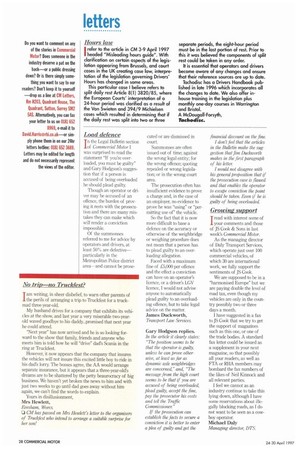Load defence
Page 30

If you've noticed an error in this article please click here to report it so we can fix it.
In the Legal Bulletin section of Commercial Motor I was surprised to read the statement "If you're overloaded, you must be guilty" and Gary Hodgson's suggestion that if a person is accused of being overloaded he should plead 1.milty.
Though an operator or driver may be accused of an offence, the burden of proving it rests with the prosecution and there are many mistakes they can make which will render a conviction impossible.
Of the summonses referred to me for advice by operators and drivers, at least 50% are defective— particularly in the Metropolitan Police district area—and cannot be prose cuted or are dismissed in court.
Summonses are often issued out of time; against the wrong legal entity; for the wrong offence; quoting repealed or wrong legislation; or in the wrong court area.
The prosecution often has insufficient evidence to prove a charge and, in the case of an employer, no evidence to prove he was "using" or "permitting use of" the vehicle.
So the fact that it is now more difficult to base a defence on the accuracy or otherwise of the weighbridge or weighing procedure does not mean that a person has to plead guilty to an overloading allegation.
Faced with a maximum fine of £5,000 per offence and the effect a conviction can have on an operator's licence, or a driver's LGV licence, I would not advise anyone to automatically plead guilty to an overloading offence, but to take legal advice on the matter.
James Duckworth, Transport Law Services.




















































































































